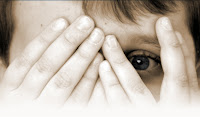Autism is:
- a brain development disorder that impairs social interaction and communication, and causes restricted and repetitive behavior, all starting before a child is three years
- a brain disorder that is associated with a range of developmental problems, mainly in communication and social interaction
- a complex developmental disability that typically appears during the first three years of life and is the result of a neurological disorder that affects the normal functioning of the brain, impacting development in the areas of social interaction and communication skills
- a developmental disability of the brain, much like dyslexia, mental retardation, or attention deficit disorder
- a developmental disability that affects a person's verbal and non-verbal communication, understanding of language, and socialization with peers
- a developmental disorder which is being diagnosed much more frequently today than it was ten years ago
- a lifelong, neurological disorder that significantly affects how a person perceives the world, interacts with other people, and communicates
- a neurological condition which people are usually born with
- a pervasive developmental disorder, which means that for most of those afflicted, autism is lifelong
- a severe developmental disorder that begins at birth or within the first two-and-a-half years of life
- at least four times more common in boys than in girls
- considered a FINAL COMMON PATHWAY because research suggests that there are several factors and conditions which may result in autism
- equally distributed among all of the social classes and also among ethnic groups, racial groups and nationalities
- four times more prevalent in boys than in girls and knows no racial, ethnic, or social boundaries
- frequently referred to as a "spectrum disorder," meaning that someone can be afflicted severely or mildly, or to any degree in between
- likely to be linked to several genes
- marked by serious difficulties in interacting and communicating with other people
- more common than childhood cancer, cystic fibrosis, and multiple sclerosis combined
- much more common in people with certain genetic, chromosomal, and metabolic disorders, such as fragile X syndrome (an inherited form of mental retardation whose name refers to a damaged and fragile-looking X chromosome), phenylketonuria (an inherited condition in which the body lacks the enzyme needed to process the amino acid phenylalanine, leading to mental retardation) and tuberous sclerosis (a rare genetic disorder that causes benign tumors to grow throughout the body and brain)
- not “a fate worse than death”
- not a mental illness
- not a psychosis or lack of reality contact
- not the result of poor parenting
- now diagnosed in 1 out of 150 American children, and some people believe the numbers may be under-reported
- one of a group of disorders known as autism spectrum disorders (ASDs)
- one of a number of possible outcomes for children with this genetic predisposition for communication or learning problems
- one of five disorders that falls under the umbrella of Pervasive Developmental Disorders (PDD), a category of neurological disorders characterized by “severe and pervasive impairment in several areas of development
- referred to as a spectrum disorder because it ranges in severity across a wide range of conditions, like the colors of a rainbow
- the most severe of the developmental disabilities with an incidence of approximately 1 per 1000 live births
- thought by the scientific community to be of genetic origin
More facts:
- Children with autism are not unruly or spoiled kids who just have a behavior problem.
- The vast majority of persons with autism are not savants, like the character portrayed by Dustin Hoffman in the movie.
- Children with autism are not without feelings and emotions. Furthermore, no known psychological factors in the development of the child have been shown to cause autism.
- It used to be thought that autism is just a fate that you accept.
- According to the Department of Education and other governmental agencies, autism is growing at a startling rate of 10-17 percent per year. And although the overall incidence of autism is consistent around the globe, it is four times more prevalent in boys than in girls.
- Most experts will say that autism is probably caused by a combination of genetic and environmental factors.
- One aspect of autism is that it is like being in perpetual culture shock, no matter where the autistic person goes or how long the autistic person stays.
- Exactly what causes autism is still unknown.
- Although a single specific cause of autism is not known, current research links autism to biological or neurological differences in the brain.
- Although autism is defined by a certain set of behaviors, children and adults can exhibit any combination of the behaviors in any degree of severity.
- It is important to remember that every person with autism is an individual.





